Introduction
- The Civil War: the main disaster breaking up the previously successful history of the USA.
- Several different dimensions of problems leading to the emergence of disagreements between the South and the North.
- The main reasons: slavery, states’ rights, expansion, and industry versus farming.
- Thesis statement: Although slavery played an important role in leading up to the Civil War, the most disputable issue at the time was states’ rights, which was the core reason why the war was initiated.
The presentation offers an overview of the main causes of the Civil War of 1861–1865 in America. The war was the main disaster breaking up the previously successful history of the USA. As Foote noted, if before 1861, the USA was viewed as “are,” after the war, it became “is.” There were several different dimensions of problems that led to the emergence of disagreements between the South and the North.
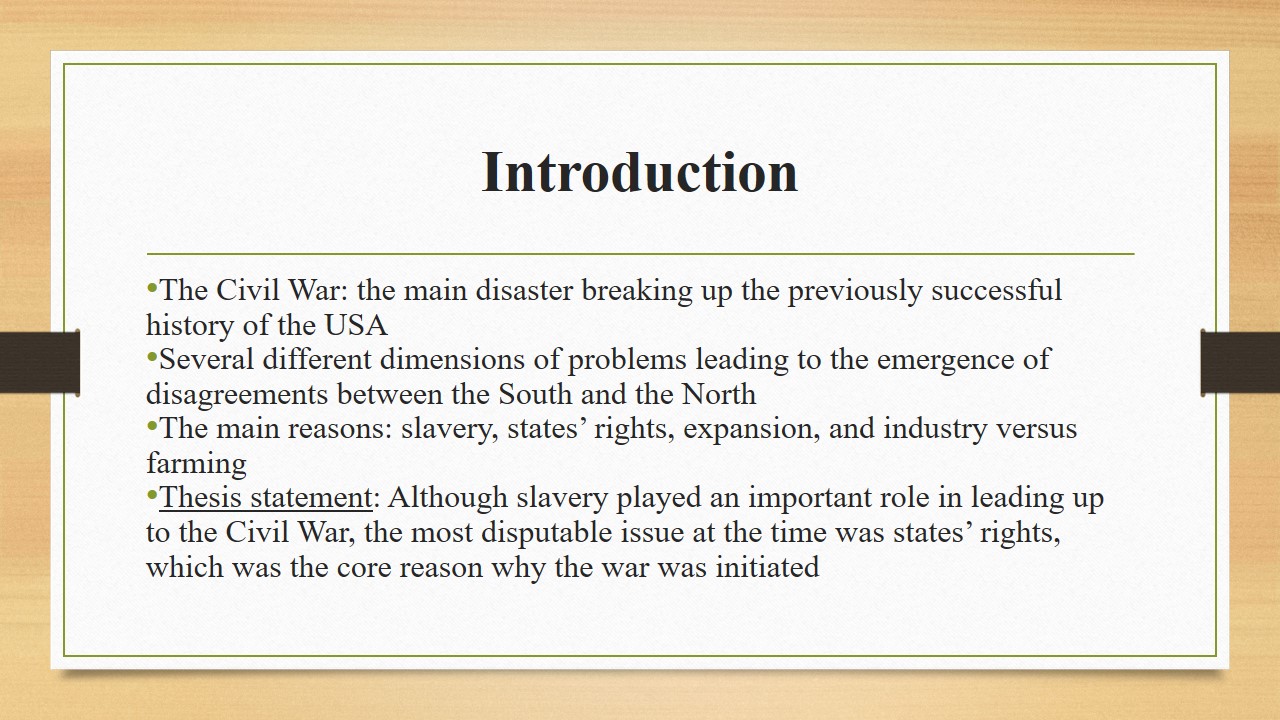
Pre-Civil War Economics in the South
- Different economic principles in the North and the South.
- Slavery: the most crucial prerequisite of running farms successfully.
- Extending the Virginia Central Railroad: much time and effort.
- Virginia became connected to western and northern markets.
- Not all farmers had farming land.
- The North: a free labor system.
In the South, much attention was given to farming and the ways of looking after the crops and domestic animals. Newspapers of the time offered advice on how to gain more productivity from one’s land and work. Important towns in the South were situated along the main roads. The extension of the railroad necessitated financial and engineering contributions and posed political challenges. Another crucial development was the growth of the tourist industry. Out of many households in Augusta considering themselves as farming ones, about two hundred did not own any land. Farmers needed slaves, and the latter became more expensive all the time. Because a free labor system dominated in the North, there appeared uncompromising conflicts between the two parts of the country.
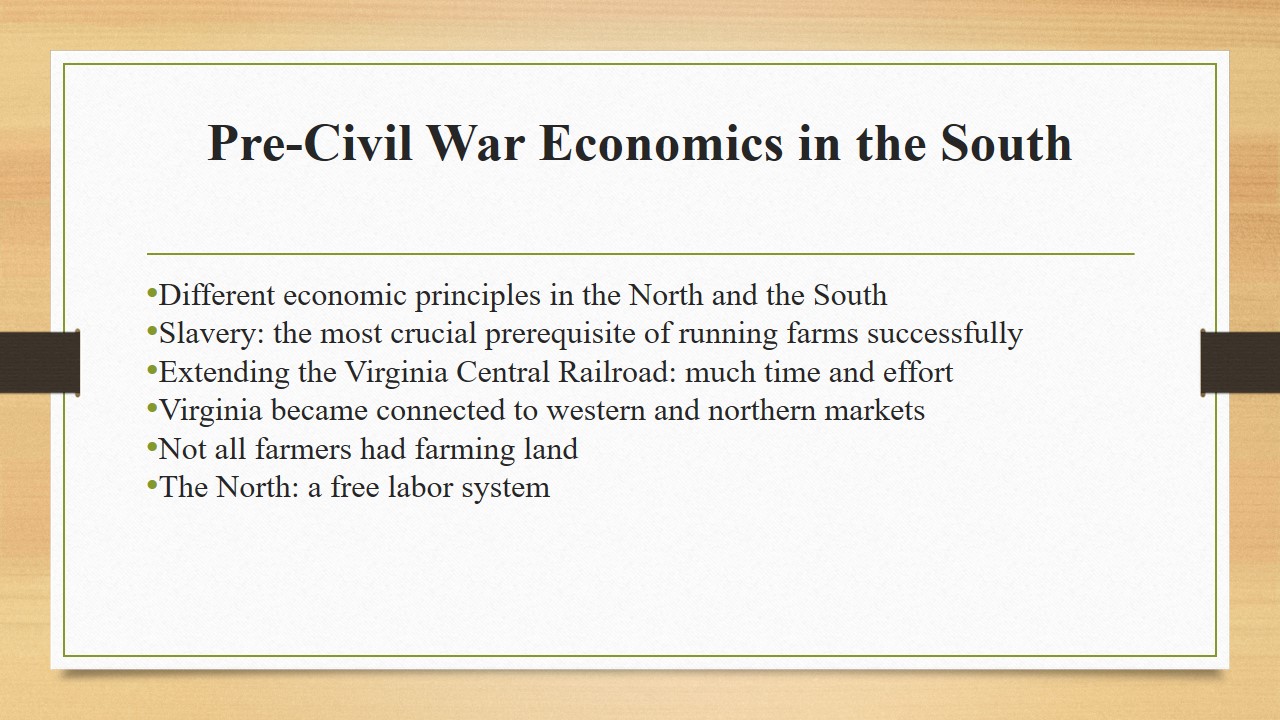
Pre-Civil War Economics in the North
- The main industry: farming.
- Production relied on domestic and immigrant labor rather than slaves’ work.
- Artisans: blacksmiths, brick makers, silversmiths, coach makers, carpenters, printers, confectioners.
- Farming included land, crops, animals, and labor.
Unlike Augusta, Franklin did not have such advantageous access to railroads and trains, which made it difficult for the county to develop in that direction. What differentiated the systems of economics most of all was the character of labor relations dominating in the two parts of the country. In the South, farming was largely concentrated on the production of cotton whereas in the North, wheat fields were more numerous. Northern farmers mostly relied on their families’ labor while southern farmers counted on slave labor. The conditions of living and working differed so much in the North and South that the former could not imagine surviving without slaves.
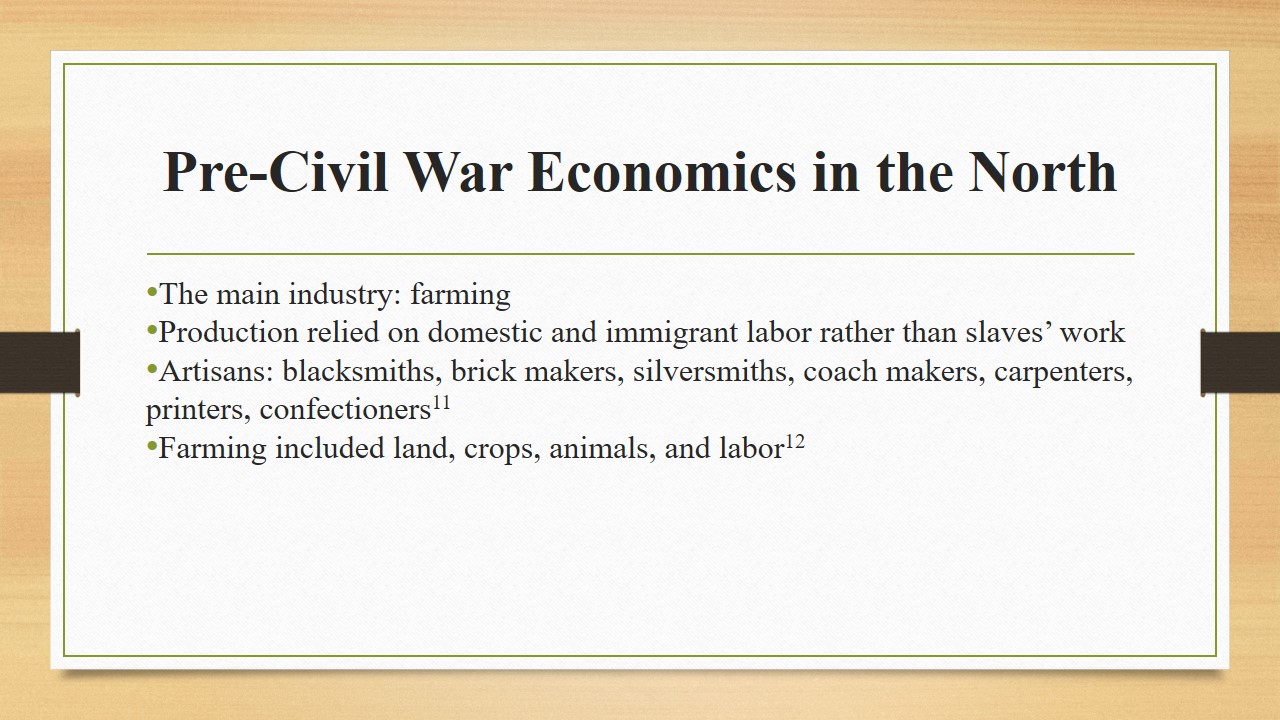
Blacks in the North before the War
- African Americans had large houses and performed a variety of duties.
- Females: household chores; males: outdoor labor.
- Black men’s occupations: chimney sweeping, ax making, and brick making and working as cutlers, barbers, blacksmiths, and whitesmiths.
- The pre-war census: about 1,788 individuals of black or mixed races in Franklin County.
- Reasons for staying: birthplace, family and friends, and better opportunities for receiving freedom.
- However, newspapers depicted blacks with contempt and inferiority.
Black families used to dwell in the majority of Franklin’s towns, but they preferred living close to one another. Both African American males and females used to work more and harder than white people. For instance, black men could work for a butcher, but their labor was considered as unskilled. Black females, who frequently worked as washerwomen or servants, worked longer hours than white females did.
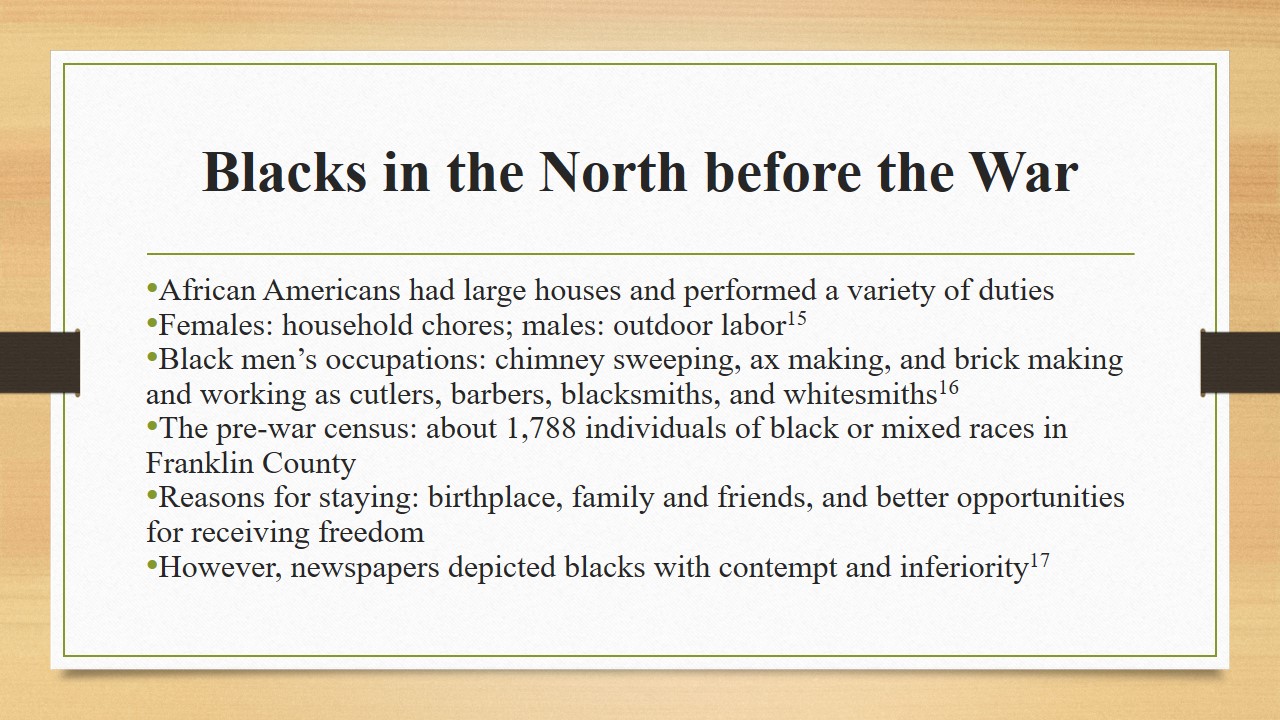
Blacks in the South in the Pre-War Period
- Far more pessimistic situation than in the North.
- Landowners, farmers, and other businessmen exploited slave labor in their work.
- Fewer opportunities for black individuals to obtain freedom.
- Slave owners had the right to exploit their slaves’ children.
In Virginia, African Americans experienced inhumane treatment, including being sold or prosecuted in case of making escape attempts. Wealthy people had the right to exploit not only their slaves but also their children since they, too, became the owners’ property. There were blacks who were afraid of being hired out because then they would be taken away from their families or friends. Along with expressing disrespect toward blacks, white people living in the South also attributed numerous criminal activities to them. Negroes in the South were regarded as unreliable and indecent individuals likely to break the law and bring harm to native citizens.
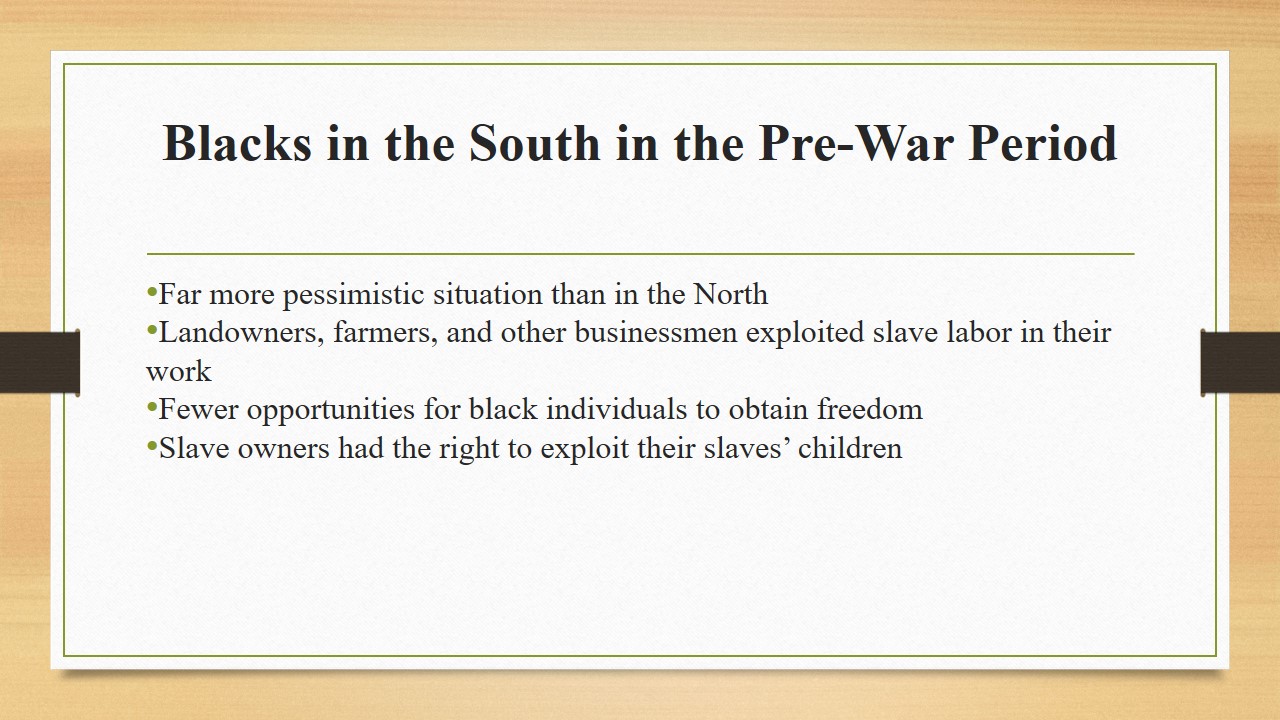
The Southern States against the Abolitionism of Slavery
- The Southern states viewed the abolition of slavery as the violation of their rights.
- Slaughter-House Cases of the Supreme Court eliminated the beneficial effects of the Fourteenth Amendment on blacks’ lives.
- Secession: the intention to leave the Union.
With the aim of protecting their states’ rights, Southerners adopted secession: the approach intended to help them leave the Union and create their own laws, which would not entail the end of slavery institution. Some researchers believe that slavery was used as a source of power by those seeking it. In May of 1861, the majority of Virginia voters supported the Ordinance of Secession. The South claimed that it merely wanted to be “relieved from the oppression of the North.”
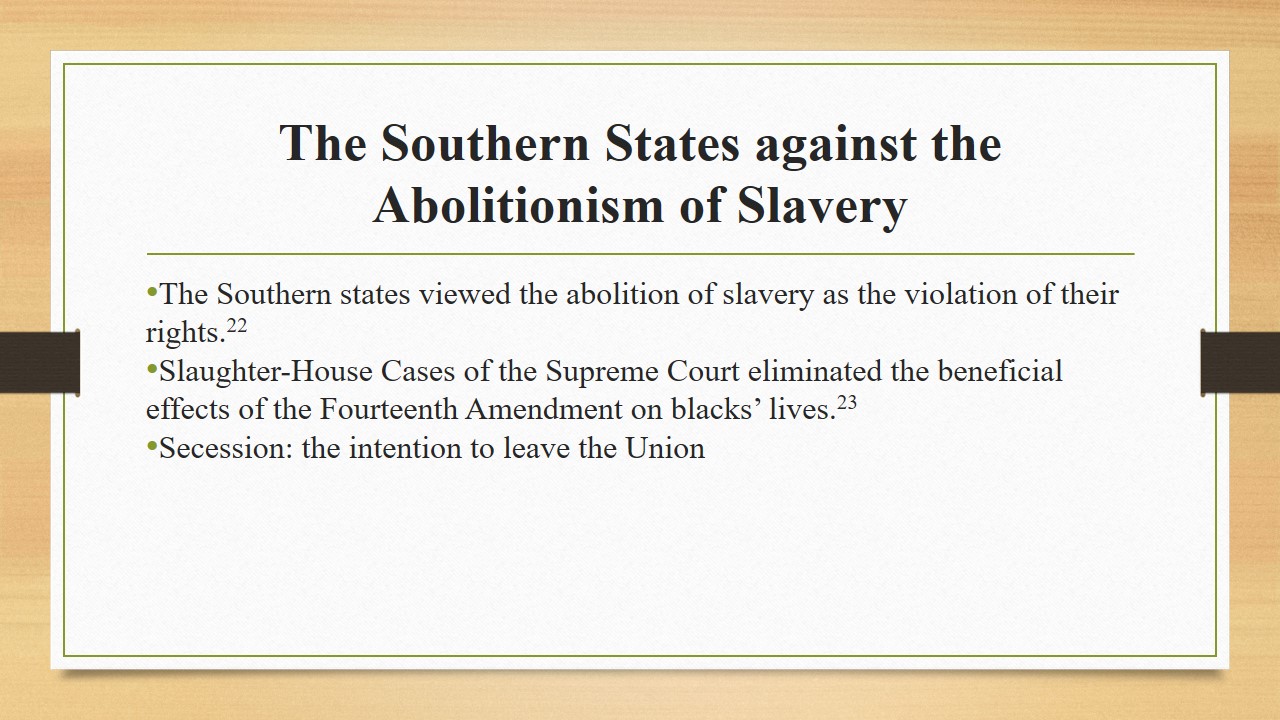
The Reaction of the North to Secession
- The Union was dissatisfied with the South’s decisions and intentions.
- The North supported Lincoln’s program.
- Political aspects of decisions.
- To keep the South in the Union, the North voted for Democrats.
- Northern leaders encouraged citizens to seek peaceful strategies.
The North not only condemned slavery but also had some economic interests in the South’s resources. The North was interested in not letting the South out of the Union since the counties with large numbers of manufacturers were likely to change their votes from Democrats to Republicans in 1860-1864. Democrats expressed their plan to find reasonable non-military solutions to meet the needs of Southerners and mitigate the conflicts and misunderstandings that had caused the desire to secede in the Southern states. In his inaugural speech, Lincoln declared that the South had nothing to worry about or be afraid of in regard to the Republican administrations’ decisions.
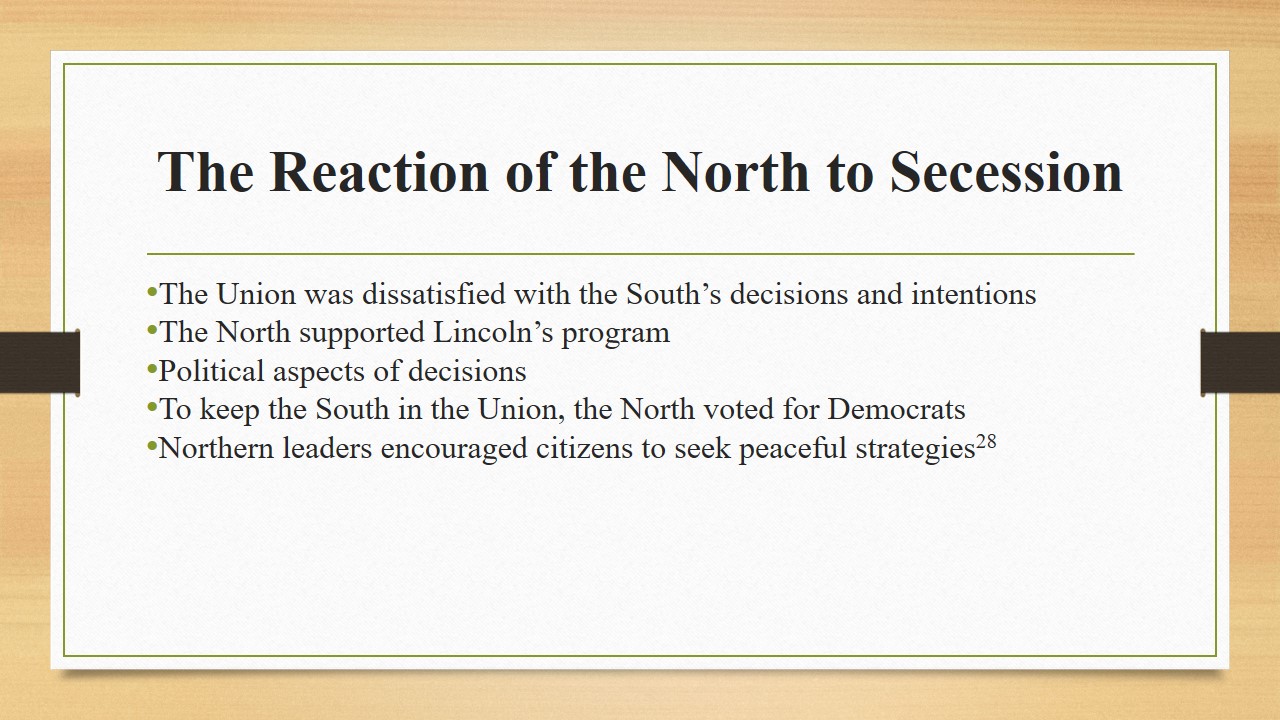
Conclusion
- The American Civil War had a devastating but decisive effect on the country’s further development.
- There were several causes of the war.
- The major problems in the pre-Civil War USA: expansion, industry versus farming, slavery, and states’ rights.
- States’ rights: the most crucial reason.
While all of the causes were closely interrelated, the issue of states’ rights served as the main cause of the war’s initiation. The South wanted to keep the right to slavery whereas the North proclaimed the abolition of this negative social and economic system. The quality of life of white and black people in both parts of the USA was quite different. While slavery was a highly significant issue in the 1860s’ USA, the question of states’ rights was the one that led to the initiation of the war.
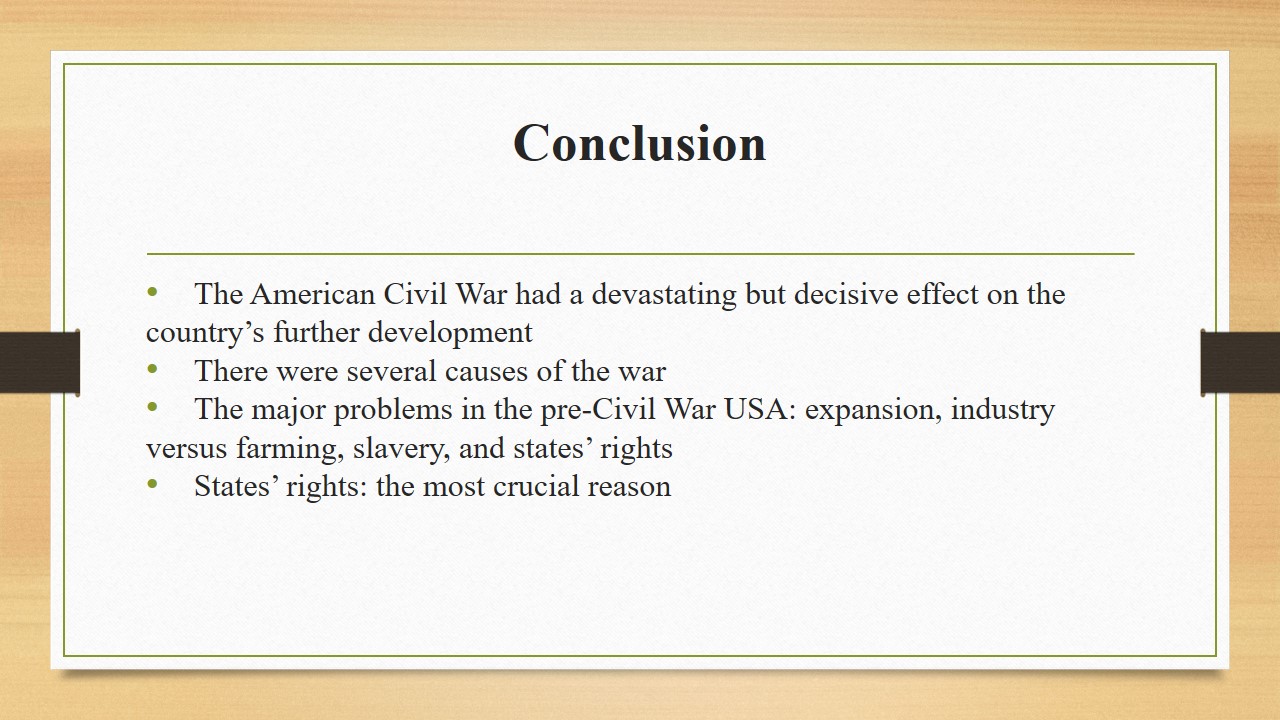
Bibliography
Farmer, Alan. The American Civil War: Causes, Course and Consequences 1803–77, 4th ed. Abingdon: Hodder Education, 2008.
Liscow, Zachary. “Why Fight Secession? Evidence of Economic Motivations from the American Civil War.” Public Choice 153, no. 1–2 (2012): 37-54.
Mountjoy, Shane. Causes of the Civil War: The Differences between the North and South. New York: Chelsea House, 2009.
Oakes, James. “Capitalism and Slavery and the Civil War.” International Labor and Working Class History 89 (2016): 195–220.
Ross, Michael A. “Justice Miller’s Reconstruction: The Slaughter-House Cases, Health Codes, and Civil Rights in New Orleans, 1861–1873.” The Journal of Southern History 64, no. 4 (1998): 649–676.
Towers, Frank. “Partisans, New History, and Modernization: The Historiography of the Civil War’s Causes, 1861-2011.” Journal of the Civil War Era 1, no. 2 (2011): 237–264.
The Valley of the Shadow. “A Closer Look at Augusta in the 1850s: African-American Lives.”. Web.
—. “A Closer Look at Augusta in the 1850s: Economic Life.”. Web.
—. “A Closer Look at Franklin in the 1850s: African-American Lives.”. Web.
—. “A Closer Look at Franklin in the 1850s: Economic Life.”. Web.
—. “Staunton Vindicator: April 2, 1859.”. Web.
—. “Staunton Vindicator: May 3, 1861.”. Web.
—. “Staunton Vindicator: May 31, 1861.”. Web.
—. “Valley Spirit: April 20, 1859.”. Web.
—. “Valley Spirit: March 6, 1861.”. Web.